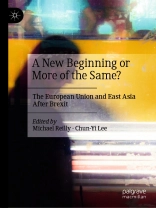The EU’s interest in and engagement with North East Asia has grown massively over the last three decades, the shaping and implementation of its policy influenced heavily by the UK and its historical links with East Asia. Brexit therefore raises questions about the future of this engagement and comes against a background of wider threats to the liberal world order, especially rising tensions between the USA and China. Worried that they may be forced to choose sides in their hitherto carefully managed relationships with the two, China’s neighbours are therefore watching with interest to see how the EU and the UK respond and manage their future relations with the region. This book goes beyond the traditional trade links to consider diplomatic and security perspectives, as well as wider issues such as the possible impact on educational and research links. It will be of interest to diplomats, scholars, and economists.
Tabela de Conteúdo
Chapter 1. Introduction.- Chapter 2. The USA-East Asia and the Struggle to Reform World Order.- Chapter 3. How should the USA and Europe respond to the strategic challenge of China? Chapter 4. The Japanese government’s response to Brexit.- Chapter 5. Title?.- Chapter 6. Building Taiwan-U.K Security Linkages after Brexit: A Bridge Too Far? Chapter 7. Brexit, Taiwan and the global semi-conductor industry.- Chapter 8. The Impact of Brexit on the Higher Education Sector and the Connection with East Asia.- Chapter 9. A New World Trade Order? The EU, BREXIT and the CPTPP.- Chapter 10. Conclusion.
Sobre o autor
Michael Reilly has 30 years of experience as a diplomat, most of it in East Asia or handling policy towards the region. His previous books include Towards an EU-Taiwan Investment Agreement (2017) and The Implications of Brexit for East Asia (co-edited with David W.F.Huang, 2018).
Dr. Chun-Yi Lee is an Associate Professor in the School of Politics and International Relations (SPIR) at the University of Nottingham. Her current research project is China’s New Normal: The Impact of China’s Rise on the Global Political Economy.












